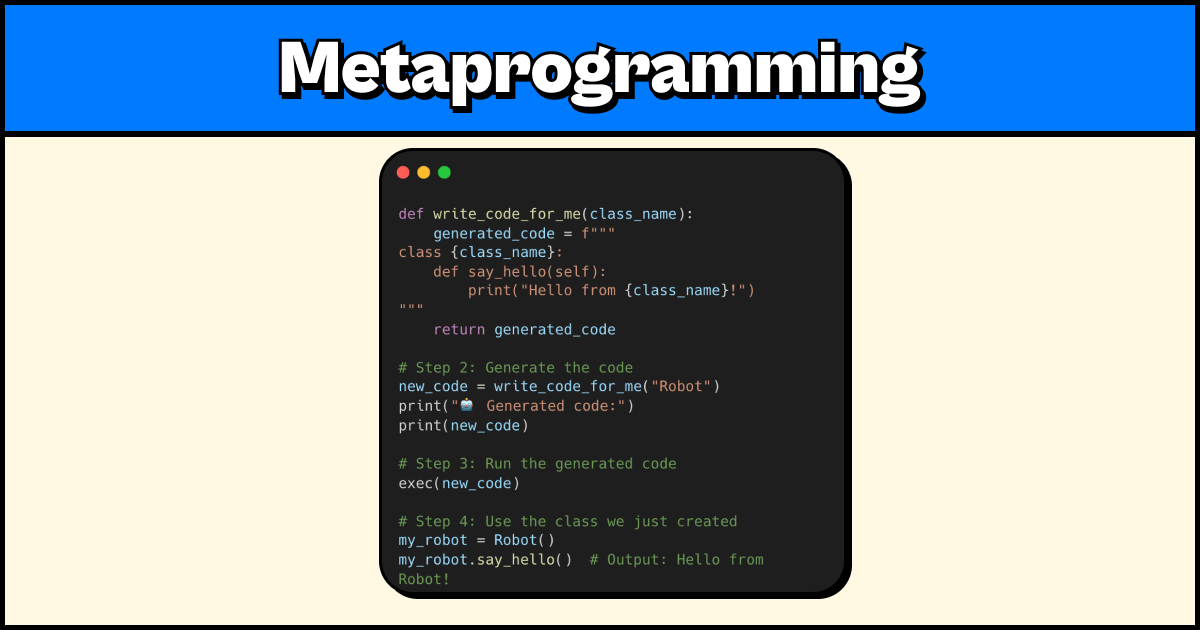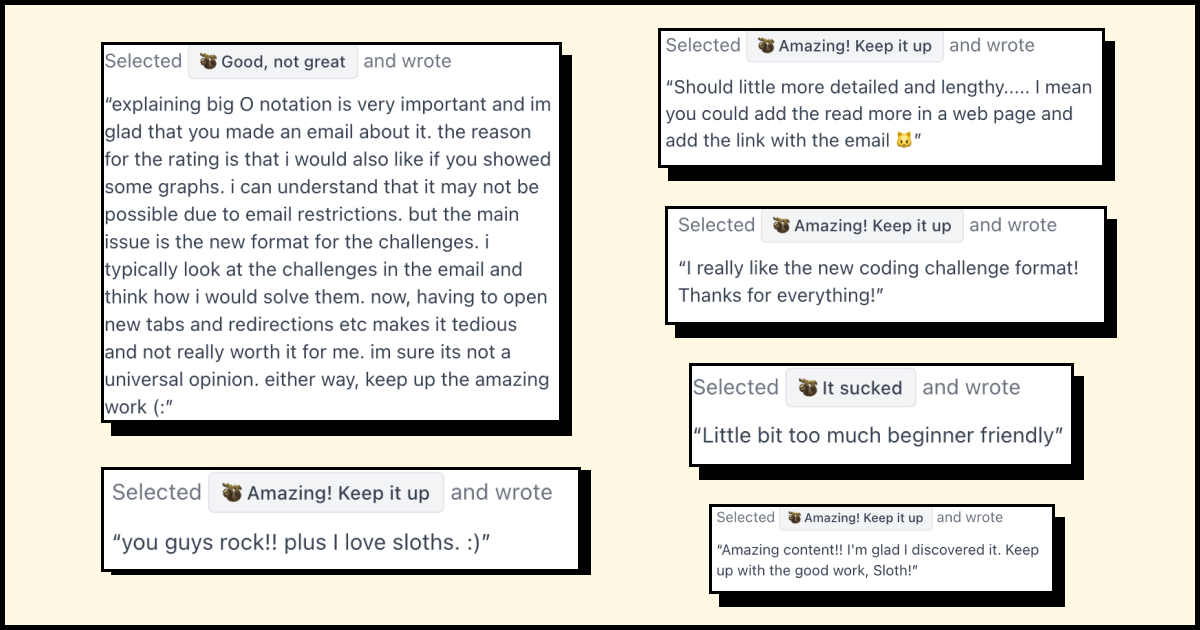- Sloth Bytes
- Posts
- 🦥 Metaprogramming For Dummies
🦥 Metaprogramming For Dummies

Hello friends!
Welcome to this week’s Sloth Bytes. I hope you had a great week 😃

An AI assistant that can understand your entire codebase?
Most AI coding assistants fall apart when your codebase gets big.
They lose context, hallucinate, go off track, or generate code you didn’t ask for.
In a massive, production-grade system, that’s not just annoying, it’s dangerous.
Augment Code is different. It’s built specifically for professional engineers working in large, fast-moving codebases.
Whether you’re working with a codebase of 100 lines or 10 million lines of code, you’ll get accurate, context-aware suggestions that actually fit your code.
There’s no need to pick a model or tweak prompts. Augment Code automatically selects the best available model and optimizes everything for you.
And with Remote Agents, you can run annoying tasks like fixing tests, writing docs, or refactoring in parallel even when your laptop is closed.
It works inside your existing tools: VS Code, JetBrains, Cursor, Windsurf, and yes even Vim.

Metaprogramming

I remember the first time I learned about metaprogramming.
I came across it because I was interested in how to make developer tools and saw the term.
These were my first thoughts
“Writing code is hard enough, but now I have to write code that writes code?”
Great time.
What is Metaprogramming?
Metaprogramming is code that operates on code. Instead of just processing data, you're processing the structure and behavior of your program itself.
Regular programming: "Here's some data, do something with it"
Metaprogramming: "Here's some code, modify it or generate more code"
A simple example you’ve probably done before
You can examine your code at runtime. This is called reflection.
Reflection Wikipedia definition: The ability of a process to examine, introspect, and modify its own structure and behavior.
class User:
def __init__(self, name):
self.name = name
user = User("Alice")
print(dir(user)) # Lists all methods and attributes
print(hasattr(user, 'name')) # Checks if attribute existsYour program becomes self-aware.
Another example: Dynamic Method Calls
With reflection, instead of hardcoding method names, you decide at runtime.
const calculator = {
add: (a, b) => a + b,
subtract: (a, b) => a - b
};
const operation = 'add'; // Could come from user input
const result = calculator[operation](5, 3);"What's the point of that? Seems useless."
I know, right? Why not just call calculator.add(5, 3) directly?
But imagine building a calculator app where users click buttons.
Instead of a giant if/else statement checking which button was clicked, you just use the button's text as the method name.
One line of code handles all operations. That's the magic.
// Instead of this mess:
if (buttonText === 'add') calculator.add(a, b);
else if (buttonText === 'subtract') calculator.subtract(a, b);
else if (buttonText === 'multiply') calculator.multiply(a, b);
// ... 20 more operations
// You could do this:
const result = calculator[buttonText](a, b);Those of you that know how to code probably still think it’s useless.
Well… I can’t deny that, BUT it’s just an example.
The Cool Part: Code Generation
You can step it up and make your code write new code (without AI.)
def create_model(name, fields):
attributes = {field: None for field in fields}
return type(name, (), attributes)
# Creates a new class at runtime
User = create_model('User', ['name', 'email', 'age'])ORMs use this heavily. When you define a model, the framework generates methods, queries, and validation logic behind the scenes.
You've Already Used Metaprogramming
Even if you haven't heard the term:
Frameworks and Libraries
ORMs
Testing Frameworks
Compilers, Assemblers, Interpreters, etc
The Cons of Metaprogramming
Debugging Nightmare: Debugging becomes confusing when code writes code.
IDE Confusion: Intellisense struggles with dynamically generated methods.
Performance Overhead: Code that writes code could have some problems…
Security Risks: Evaluating strings as code enables injection attacks.
When to Use It
Good uses:
Eliminating significant code duplication
Creating cleaner APIs for complex operations
Building development tools
Bad uses:
Showing off cleverness (don’t be a nerd.)
Making simple things complex
When static code works just as well
Metaprogramming is kinda like having superpowers.
You can bend the rules and create incredibly flexible code.
But every metaprogramming technique should solve a real problem, not create new ones.
The best metaprogramming is invisible to users. They get a clean experience while you handle complexity behind the scenes.
When done right, it creates magical developer experiences. When done wrong, it creates maintenance nightmares.
Use it wisely.
If you're writing code that writes code that writes code, you've probably gone too far.
You’re a nerd and wanna learn more?


Thanks for the feedback!



Thanks to everyone who submitted!
Look like people preferred the old format… So let’s do that.
Sherlock and the Valid String
Sherlock considers a string to be valid if all characters of the string appear the same number of times. It is also valid if he can remove just one character at one index in the string s, and the remaining characters will occur the same number of times.
Given a string, determine if it is valid. If so, return "YES", otherwise return "NO".
Examples
isValid("abc")
output = "YES"
// This is a valid string because frequencies are: {a: 1, b: 1, c: 1}
isValid("abcc")
output = "YES"
// This is a valid string because we can remove one c and have one of each character in the remaining string.
isValid("abccc")
output = "NO"
// This string is not valid as even if we remove one c,
// It still leaves character frequencies of: {a: 1, b: 1, c: 2}
isValid("aabbcd")
output = "NO"
isValid("aabbccddeefghi")
output = "NO"
isValid("abcdefghhgfedecba")
output = "YES"How To Submit Answers
Reply with
A link to your solution (github, twitter, personal blog, portfolio, replit, etc)
or if you’re on the web version leave a comment!
If you want to be mentioned here, I’d prefer if you sent a GitHub link or Replit!
What'd you think of today's email? |
Want to advertise in Sloth Bytes?
If your company is interested in reaching an audience of developers and programming enthusiasts, you may want to advertise with us here.







Reply